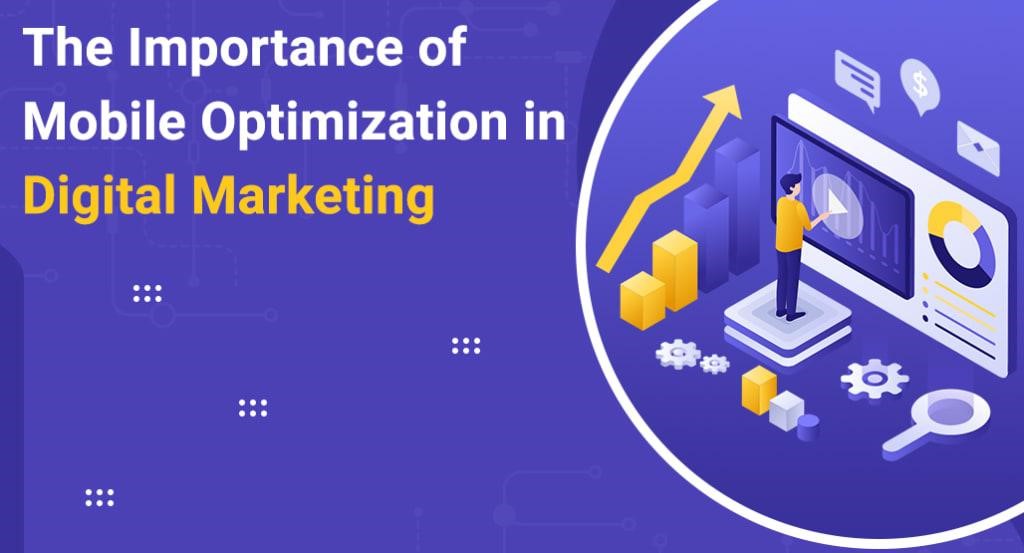In today’s digital era, where smartphones and tablets have become ubiquitous companions in our daily lives, the importance of mobile optimisation in digital marketing cannot be overstated. From enhancing user experience to boosting search engine rankings, mobile optimisation plays a pivotal role in driving success for businesses in the online realm.
1. Understanding Mobile Optimization
Mobile optimisation is designing websites, content, and digital marketing strategies to ensure seamless functionality and visual appeal across various mobile devices. This includes smartphones, tablets, and other portable gadgets with different screen sizes and resolutions. At its core, mobile optimisation aims to deliver an optimal user experience regardless of the device used.
2. The Significance of User Experience
One of the primary reasons why mobile optimisation is crucial in digital marketing is its impact on user experience (UX). With a significant portion of internet traffic originating from mobile devices, ensuring a smooth and intuitive experience for mobile users is paramount. Websites or digital content not optimised for mobile often suffer from high bounce rates and low engagement, as users quickly lose interest due to poor navigation and slow loading times.
3. SEO Benefits of Mobile Optimization
In addition to enhancing user experience, mobile optimisation also yields significant benefits regarding search engine optimisation (SEO). Search engines like Google prioritise mobile-friendly websites in their rankings, considering mobile responsiveness, page loading speed, and overall usability on mobile devices. Websites that fail to meet these criteria may experience a drop in search engine rankings, resulting in reduced visibility and organic traffic.
4. Accessibility and Global Reach
Mobile optimisation plays a vital role in ensuring accessibility for users worldwide, particularly in regions where mobile devices are the primary means of internet access. By optimising digital content for mobile, businesses can reach a broader audience and cater to diverse demographics with varying technological capabilities. This inclusivity not only expands a brand’s reach but also fosters engagement and loyalty among mobile users.
5. Conversion Rate Optimization
A seamless mobile experience drives conversion rates and achieves marketing objectives. Whether making a purchase, filling out a form, or subscribing to a newsletter, users are more likely to take action if the process is streamlined and user-friendly on their mobile devices. Businesses can capitalise on mobile traffic and maximise conversions by optimising conversion funnels and eliminating barriers to engagement.
6. Gaining a Competitive Edge
In today’s competitive digital landscape, having a mobile-optimized presence can differentiate a brand from its competitors. Users are more likely to engage with brands that offer a seamless mobile experience, and they may choose competitors if their mobile presence needs to be improved. By investing in mobile optimisation, businesses can gain a competitive edge and position themselves as leaders in their respective industries.
7. Social Media Engagement
Social media platforms play a significant role in driving mobile traffic and engaging audiences. Mobile-optimized content is more likely to be shared and interacted with on social media, increasing brand visibility and reach. By tailoring content for mobile consumption and leveraging the power of social media marketing, businesses can amplify their digital presence and foster meaningful connections with their target audience.
8. Protecting Brand Reputation
A poorly optimised mobile experience can tarnish a brand’s reputation and erode consumer trust. In an era where user expectations are higher than ever, encountering issues such as slow loading times or unresponsive design on mobile devices can leave a negative impression on users. By prioritising mobile optimisation and delivering a seamless user experience, businesses can safeguard their brand reputation and build trust with their audience.
9. Mobile Commerce and Transactional Capabilities
Mobile optimisation is especially crucial in the realm of e-commerce, where the convenience of mobile shopping has revolutionised consumer behaviour. Mobile-friendly websites and apps enable users to browse products, make purchases, and track orders seamlessly from their smartphones or tablets. Businesses can capitalise on the growing mobile commerce trend and drive sales through mobile channels by optimising the checkout process and implementing mobile payment options.
10. Personalization and Targeted Marketing
Mobile optimisation opens up opportunities for personalised marketing initiatives that resonate with individual users more personally. Businesses can deliver targeted content and promotional offers tailored to each user’s preferences and interests by leveraging data insights and user behaviour patterns. This level of personalisation enhances the user experience and increases engagement and conversion rates, ultimately driving revenue growth for businesses.
11. Mobile App Development and Engagement
In addition to mobile-optimized websites, businesses can further enhance their mobile presence by developing mobile apps. Mobile apps offer users a more immersive and interactive experience, allowing enterprises to deliver value-added services, exclusive content, and loyalty programs directly to their customers’ devices. By investing in mobile app development and engagement strategies, companies can foster long-term relationships with their audience and drive brand loyalty.
Conclusion
In conclusion, mobile optimization is not merely a recommendation but a necessity in modern digital marketing strategies, especially for digital agency Melbourne. The benefits of mobile optimization are undeniable, from enhancing user experience and improving search engine rankings to driving conversions and fostering brand loyalty. By prioritizing mobile-friendly design, optimizing digital content for mobile consumption, and leveraging mobile technologies to engage with users, businesses can unlock new growth opportunities, expand their reach, and stay ahead in an increasingly mobile-centric world.



